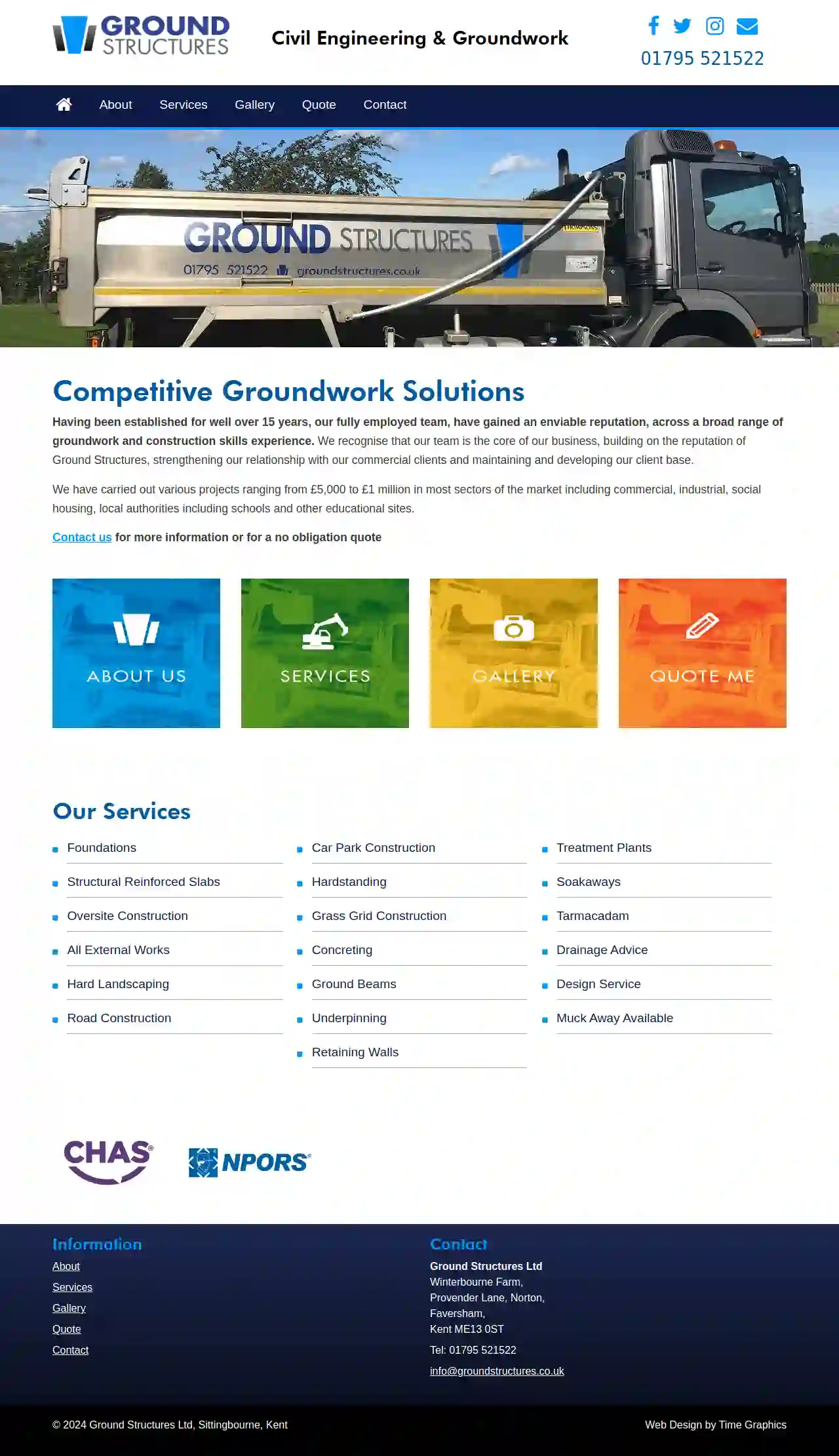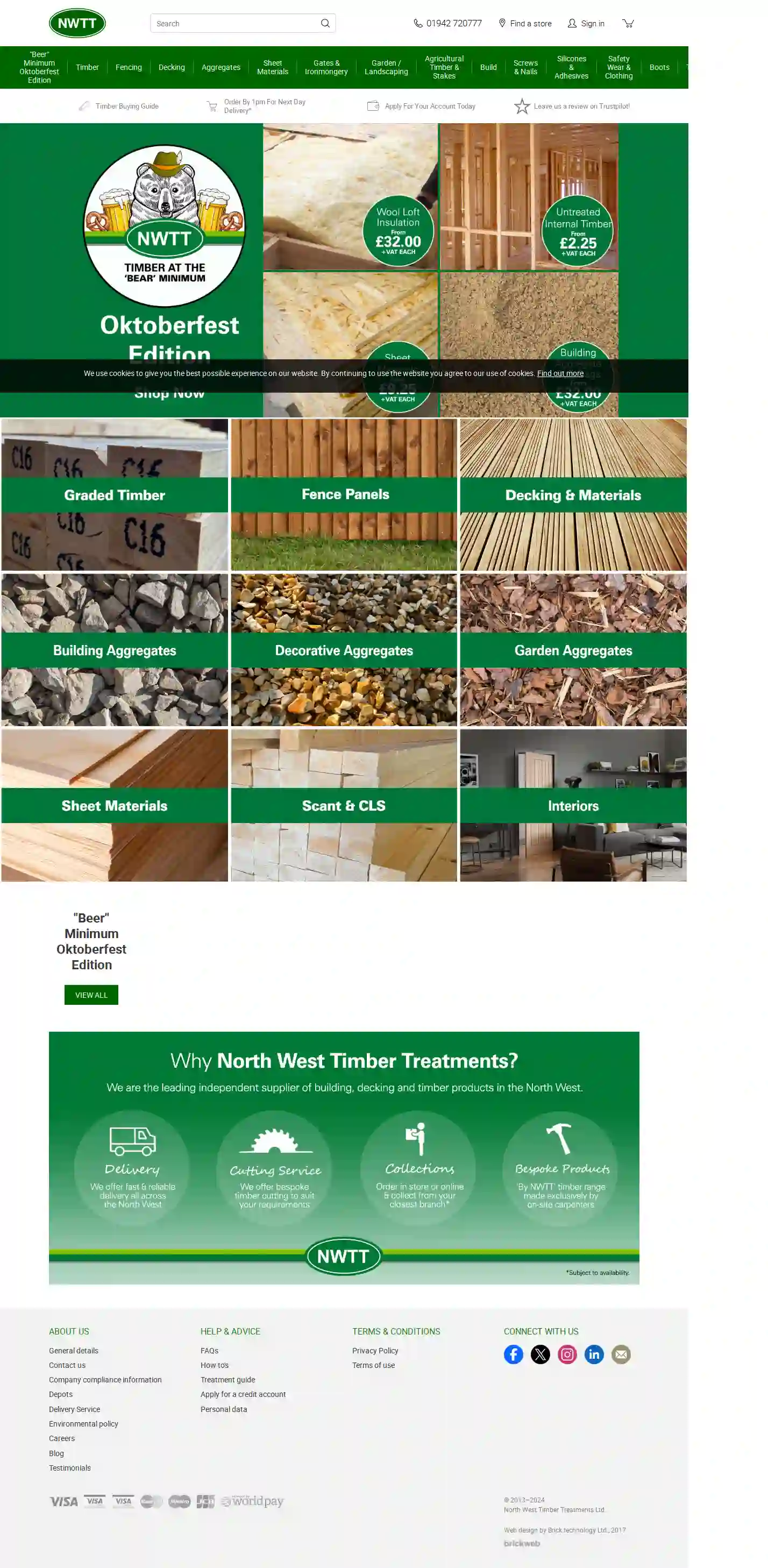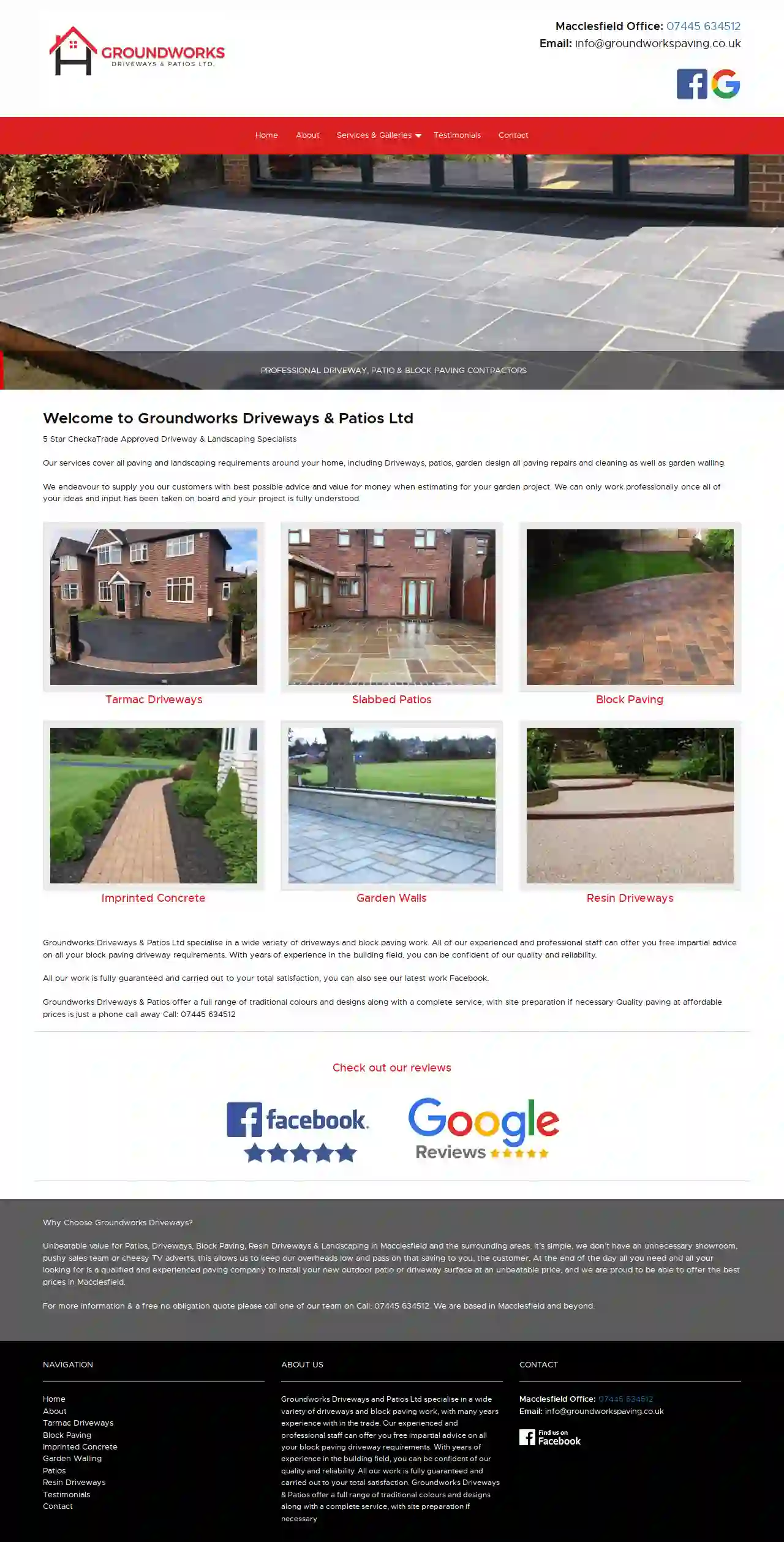Excavation Contractors Rhuthun
Find top Excavation Companies in Rhuthun
Get up to 3 Excavation Contractors Near Me quotes for your project today! Compare profiles, reviews, accreditations, portfolio, etc... and choose the best service.

Ground Structures Ltd
53 reviewsWinterbourne Farm, Provender Lane, Norton, Faversham, ME13 0ST, GBGround Structures: Your Foundation for Success Ground Structures is a well-established groundwork and construction company with over 15 years of experience. Our dedicated team has built a strong reputation for delivering high-quality, competitive solutions across a wide range of projects. We understand that our team is the heart of our business, and we are committed to building lasting relationships with our commercial clients. We have a proven track record of successfully completing projects ranging from £5,000 to £1 million in various sectors, including commercial, industrial, social housing, and educational facilities. Our commitment to excellence ensures that we deliver projects on time and within budget, exceeding client expectations. At Ground Structures, we are passionate about providing comprehensive groundwork and construction solutions. Our services encompass infrastructure, sub-structure, foundations, drainage, and external works. We are dedicated to delivering projects that meet the highest safety standards, utilizing our own machinery and ensuring our team is fully certified and trained. We are proud to partner with large construction companies who recognize our expertise in civil engineering and groundworks. Our commitment to deadlines and efficiency makes us the preferred choice for construction companies seeking reliable and experienced groundwork specialists. We ensure that the foundations of your projects are completed on time and within budget, allowing for seamless development from the ground up. Our business is your business. We are dedicated to providing exceptional service and building long-term partnerships with our clients.
- Services
- Why Us?
- Gallery
Get Quote
Rosbotham Timber
4.596 reviewsNWTT House, Lockett Road, NWTT HouseLockett RoadSouth Lancs Industrial EstateAshton in MakerfieldWigan, Wigan, WN4 8DE, GBAbout North West Timber Treatments Ltd North West Timber Treatments Ltd (NWTT) is a leading supplier of timber, building materials, and landscaping products in the North West of England. We have been serving the trade and public for over 30 years, building a reputation for quality, service, and value. Our Mission Our mission is to provide our customers with the best possible service and value for money. We are committed to offering a wide range of high-quality products at competitive prices, backed by expert advice and excellent customer service. Our Team Our team is made up of experienced and knowledgeable professionals who are passionate about helping our customers find the right products for their needs. We are always happy to offer advice and guidance, whether you are a seasoned professional or a DIY enthusiast. Our Experience With over 30 years of experience in the timber and building materials industry, we have the knowledge and expertise to meet the needs of our customers. We are constantly updating our product range and services to ensure that we are offering the latest and greatest products available.
- Services
- Why Us?
- Gallery
Get Quote
MTS Cleansing Services Ltd
4.219 reviewsSouthern Water, Harestock WTW, Southern Water Harestock WTW Andover Road Harestock, Winchester, SO22 6NR, GBMTS Cleansing Services Ltd MTS offer a comprehensive range of domestic, commercial and industrial waste management services covering CCTV surveys, blocked drains, sewer/drain cleaning, flood response, waste disposal and recycling - no job is too big or small. 24 hours a day, 7 days a week We’re here to help Drainage, waste management and recycling specialists MTS is a trusted service provider with over 36 years of experience in the industry. We are committed to providing our customers with the highest quality services and are always available to help in times of need. Our team of experienced and qualified professionals are dedicated to providing a rapid response to all our customers, ensuring that your needs are met quickly and efficiently.
- Services
- Why Us?
- Gallery
Get Quote
Metro Rod
Ashwood Court, Tytherington Business Park, Macclesfield, Cheshire, SK10 2XF, GBMetro Rod: Your Trusted Drainage Experts Metro Rod is the UK's leading drainage company, providing professional and reliable services for both businesses and homes. With over 40 locally-based teams across the UK, we offer the most comprehensive drainage solutions, exceptional customer service, and the fastest response times. Whether you're facing a drainage emergency, a recurring problem, or simply need routine maintenance, our team of highly qualified engineers is here to help. We understand that drainage issues can be disruptive and stressful. That's why we're committed to providing a seamless and efficient service, from the initial consultation to the final solution. Our team is equipped with the latest technology and expertise to handle any drainage challenge, no matter how complex or challenging. At Metro Rod, we pride ourselves on our commitment to customer satisfaction. We go the extra mile to ensure that our clients are happy with our work and that their drainage systems are functioning properly. We also offer a range of services to help prevent future problems, such as regular maintenance and inspections.
- Services
- Why Us?
- Accreditations
- Gallery
Get Quote
Cheshire West & Chester Building Solutions
Chester, GBCheshire West and Chester Building Solutions: Where Quality Meets Craftsmanship At Cheshire West and Chester Building Solutions, we're more than just builders; we're visionaries. We take pride in transforming dreams into reality, bringing decades of experience and an unwavering commitment to quality to every project. Our reputation is built brick by brick on the foundation of our clients' recommendations. We combine traditional craftsmanship with modern techniques to deliver projects that stand the test of time. Whether you're looking to expand your home, reimagine your garage, or create a stunning outdoor space, we're here to help you achieve your vision. Our team of skilled professionals is dedicated to providing exceptional service and exceeding your expectations. We believe in open communication, transparency, and working closely with our clients to ensure their complete satisfaction. Contact us today to discuss your project and let us help you build your dream.
- Services
- Why Us?
- Gallery
Get Quote
Clarke Foundations
52 reviews3 The Pinnacles, St Marys Island, Kent, ME4 3PN, GBSetting solid foundations for decades Clarke foundations is a specialist foundations and groundworks services contractor company based in Kent, also providing services to Hampshire, Surrey, Sussex and Essex. With decades of experience we pride ourselves in offering advice, reliable and cost effective calculations & designs customised to meet individual requirements. We effectively manage a project and keep in regular contact with clients throughout ongoing works.
- Services
- Why Us?
- Our Team
- Testimonials
- Gallery
Get Quote
Creative Landscapes - Landscaping Services Southport
518 reviewsChester, GBCreative Landscapes Southport At Creative Landscapes, we are passionate about turning ordinary outdoor spaces into extraordinary landscapes. We specialize in crafting outdoor environments that are both aesthetically stunning and functionally practical. More About Us We understand that creating your dream landscape is an investment. That's why we offer hassle-free financing options designed to make your vision achievable without breaking the bank. Experience the convenience of expert guidance right at your doorstep. Our complimentary at-home consultations are designed to bring our landscape expertise directly to you. Our dedication to precision and attention to detail sets us apart. With skilled artisans at the helm, we craft landscapes that not only meet but exceed your expectations. Your trust is our priority. We are fully licensed and insured, giving you the confidence that your project is in capable hands with our commitment to safety and professionalism.
- Services
- Why Us?
- Testimonials
- Gallery
Get Quote
Opal constructions
52 reviewsChester, GBAbout Opal Constructions Opal Constructions are one of Portsmouth’s premier kitchen worktop fitting specialists. We work with a wide range of materials and styles to help bring a fresh look to homes across the area. Our team of specialist worktop fitters have many years of experience as well as being fully insured, highly trained and a keen sense of pride in their jobs. We provide a comprehensive range of worktops including laminate, solid wood, quartz and granite. Contact us today for a free quotation for your requirements. Why Choose Us No job rushed Perfect finish every time Attention to detail Fully insured Competitive prices Locally based team Clean and tidy service No job ever rushed Our team work efficiently to ensure their work is completed on time without the risk of ever needing to rush any aspect of the job Attention to detail We pay close attention to every job we complete, allowing us to finish each project knowing we’ve done the very best job possible Fully insured Our team are highly trained and experienced but are also fully insured to protect our customers and their property Competitive prices By working solely on a mobile basis, we’re able to keep our operating costs low which allows us to keep our prices so competitive Highly rated service We aim to provide the best service and are proud to have so many genuine reviews from customers we’ve worked with over the years Clean and tidy team The nature of our job is quite messy but we remove any packaging and clean up after ourselves so you can enjoy your new kitchen
- Services
- Why Us?
- Testimonials
- Gallery
Get Quote
Groundworks Driveways & Patios
58 reviewsWaters Green House, Waters Green, Waters Green HouseWaters GreenMacclesfield, Macclesfield, SK11 6LF, GBAbout Groundworks Driveways & Patios Ltd Groundworks Driveways and Patios Ltd specialise in a wide variety of driveways and block paving work, with many years experience with in the trade. Our experienced and professional staff can offer you free impartial advice on all your block paving driveway requirements. With years of experience in the building field, you can be confident of our quality and reliability. All our work is fully guaranteed and carried out to your total satisfaction. Our Services Groundworks Driveways & Patios offer a full range of traditional colours and designs along with a complete service, with site preparation if necessary. Why Choose Groundworks Driveways? Unbeatable value for Patios, Driveways, Block Paving, Resin Driveways & Landscaping in Macclesfield and the surrounding areas. It’s simple, we don’t have an unnecessary showroom, pushy sales team or cheesy TV adverts, this allows us to keep our overheads low and pass on that saving to you, the customer. At the end of the day all you need and all your looking for is a qualified and experienced paving company to install your new outdoor patio or driveway surface at an unbeatable price, and we are proud to be able to offer the best prices in Macclesfield.
- Services
- Why Us?
- Testimonials
- Gallery
Get Quote
Town & Country Constuction & Groundworks
51 reviewsFour Oakes, Eaves Lane, Cheadle, ST10 1TL, GBTown and Country Groundworks: Your Trusted Partner for Groundwork and Civil Engineering Projects Based in Cheadle, Staffordshire, Town and Country Groundworks is a leading provider of comprehensive groundwork and civil engineering services, operating nationwide. We are committed to delivering proactive, intelligent solutions that meet the unique needs of each project, ensuring timely and budget-conscious completion. Our team of experienced and time-served operatives is dedicated to providing a high level of service, characterized by our flexible, forward-thinking approach, open communication, and close client collaboration. We believe in building strong relationships with our clients, ensuring their complete satisfaction throughout the project lifecycle. With over 20 years of experience, we have a proven track record of success in a wide range of projects, including new builds, extensions, roadway and car park construction, and luxury builds. We have worked with prestigious clients such as Premier Inn, Whitbread, JD Wetherspoon, Mitchell and Buttler, Toby Carvery, Harvester, Miller and Carter, Tesco, and Wildes Group. Our commitment to quality, efficiency, and client satisfaction has earned us a reputation as a reliable and trusted partner in the industry. We are dedicated to exceeding expectations and delivering exceptional results on every project.
- Services
- Why Us?
- Gallery
Get Quote
Over 13,059+ Excavation Companies on our directory
Our excavation providers operate in Rhuthun & beyond!
ExcavationHQ has curated and vetted Top Excavation Contractors near Rhuthun. Find the most reliable contractor today.
Frequently Asked Questions About Excavation Contractors
- Determine the Area: Measure the length and width of the area you want to fill. Multiply them to get the area in square feet (or meters).
- Determine the Depth: Measure the difference between the existing grade and the desired grade (how much you need to raise the ground). This is the depth of fill required.
- Calculate Volume: Multiply the area (step 1) by the depth (step 2) to get the volume in cubic feet (or meters).
- Account for Compaction: Fill dirt compacts when it settles, so add 10% to 25% to the calculated volume to account for compaction. The exact percentage depends on the type of fill material.
- Spring and Fall: Often considered favorable due to moderate temperatures and drier soil conditions.
- Summer: Can be suitable, but hot weather can make working conditions challenging and might require additional measures (shade, hydration) for workers.
- Winter: Excavation in winter can be more difficult due to frozen ground, snow, and potential delays caused by inclement weather. It might also require specialized equipment or techniques.
- Planning and Surveying: Defining the excavation area, marking utility lines, and determining the required depth and grade.
- Site Preparation: Clearing vegetation, removing obstacles, and ensuring site accessibility.
- Excavation: Using appropriate equipment (excavators, backhoes, etc.) to remove earth and create the desired excavation.
- Hauling and Disposal: Transporting excavated material to designated disposal sites, complying with environmental regulations.
- Backfilling and Compaction: Refilling the excavation with suitable material and compacting it to achieve the required density and stability.
- Grading and Finishing: Leveling and shaping the surface to the final grade for landscaping or construction.
- Project Size and Scope: The larger and more complex the excavation, the higher the cost.
- Soil Type: Different soil types require different equipment and techniques, impacting costs. Rocky or clay-rich soil can be more expensive to excavate than loose soil.
- Accessibility: Difficult-to-access sites might require specialized equipment or additional labor, increasing expenses.
- Disposal Costs: Hauling away excavated material (soil, rocks, etc.) to disposal sites incurs additional fees.
- Permits and Inspections: Depending on local regulations, permits and inspections might be required, adding to the overall cost.
How do I calculate how much dirt I need for fill?
What is the best time of year for excavation?
What is the excavation process?
How much does excavation cost?
How do I calculate how much dirt I need for fill?
- Determine the Area: Measure the length and width of the area you want to fill. Multiply them to get the area in square feet (or meters).
- Determine the Depth: Measure the difference between the existing grade and the desired grade (how much you need to raise the ground). This is the depth of fill required.
- Calculate Volume: Multiply the area (step 1) by the depth (step 2) to get the volume in cubic feet (or meters).
- Account for Compaction: Fill dirt compacts when it settles, so add 10% to 25% to the calculated volume to account for compaction. The exact percentage depends on the type of fill material.
What is the best time of year for excavation?
- Spring and Fall: Often considered favorable due to moderate temperatures and drier soil conditions.
- Summer: Can be suitable, but hot weather can make working conditions challenging and might require additional measures (shade, hydration) for workers.
- Winter: Excavation in winter can be more difficult due to frozen ground, snow, and potential delays caused by inclement weather. It might also require specialized equipment or techniques.
What is the excavation process?
- Planning and Surveying: Defining the excavation area, marking utility lines, and determining the required depth and grade.
- Site Preparation: Clearing vegetation, removing obstacles, and ensuring site accessibility.
- Excavation: Using appropriate equipment (excavators, backhoes, etc.) to remove earth and create the desired excavation.
- Hauling and Disposal: Transporting excavated material to designated disposal sites, complying with environmental regulations.
- Backfilling and Compaction: Refilling the excavation with suitable material and compacting it to achieve the required density and stability.
- Grading and Finishing: Leveling and shaping the surface to the final grade for landscaping or construction.
How much does excavation cost?
- Project Size and Scope: The larger and more complex the excavation, the higher the cost.
- Soil Type: Different soil types require different equipment and techniques, impacting costs. Rocky or clay-rich soil can be more expensive to excavate than loose soil.
- Accessibility: Difficult-to-access sites might require specialized equipment or additional labor, increasing expenses.
- Disposal Costs: Hauling away excavated material (soil, rocks, etc.) to disposal sites incurs additional fees.
- Permits and Inspections: Depending on local regulations, permits and inspections might be required, adding to the overall cost.